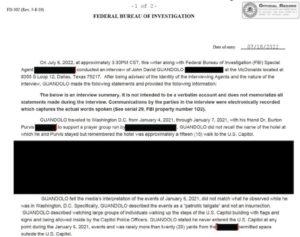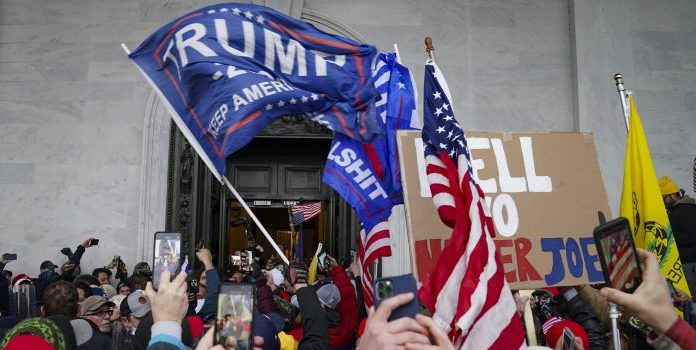(Ken Silva, Headline USA) In February, Jan. 6 defendant William Pope identified two possible plainclothes FBI agents at Capitol Hill, along with the FBI’s former liaison to the Capitol Police—all three of them passively viewing the events of J6 unfold, and at least one of them cheering.
“Oh! Oh! Oh man! This is huge!” a suspected agent can be heard saying on recently released surveillance footage.
I have filed a motion to compel the government to identify active-duty FBI employees who were in the crowd at the Capitol with former FBI Liaison to Capitol Police John Guandolo on January 6.
You can read the full redacted PDF here:https://t.co/gIEtUyhfDa pic.twitter.com/3RVjFelJRk
— 🇺🇸 (@FreeStateWill) February 12, 2024
Since then, it has been revealed that the agents were all interviewed by the FBI. But even though an FBI document indicates that the interviews were recorded, the Justice Department says it has no reason to believe that such recordings exist.
The likely existence of the interview recordings was revealed during the criminal proceedings of Jan. 6 defendant Rebecca Lavrenz, who’s known as the “praying grandma.” Lavrenz was reportedly found guilty of several misdemeanor charges Thursday, following her unsuccessful bid to compel the DOJ to provide the interviews of the former and current agents.
In her unsuccessful motion to compel the DOJ to give her the interviews, Lavrenz filed several pieces of evidence with the court—including an FBI document indicating that recordings of the interviews exist, as well as the DOJ’s emails refusing to provide the interviews.
The FBI document about the recordings was a heavily redacted summary of an interview the bureau conducted with its former agent and liaison to the Capitol Police, John Guandolo.
“The below is an interview summary. It is not intended to be a verbatim account and does not memorialize all statements made during the interview,” the FBI summary states. “Communications by the parties in the interview were electronically recorded, which captures the actual words spoken.”

Armed with that document, Lavrenz’s lawyers asked the DOJ to provide them with the interview recording, as well as the interviews of the two suspected agents with Guandolo on Jan. 6. But a DOJ lawyer responded that the recordings don’t exist.
“I am not aware of any audio of the interview and have no reason to believe any exists,” a DOJ attorney said.
When Lavrenz’s lawyers pointed to the FBI document indicating that recordings do, in fact, exist, the DOJ still denied their request.
A federal judge also backed the DOJ, denying Lavrenz’s motion to compel. The judge did not state the reasons for his decision.
Meanwhile, Pope has not yet gone to trial. He still has an outstanding motion to compel the DOJ to identify all FBI employees who were on Capitol grounds, as well as all other local law enforcement with whom Guandolo had contact—and to produce all related discovery.
According to Pope, his findings indicate that active-duty FBI agents perceived events at the Capitol to not be criminal.
“From the clapping and celebratory expression, we can conclude that these FBI agents were in favor of people accessing the building and that they believed the people had a First Amendment right to be there,” Pope said in his February motion.
Ken Silva is a staff writer at Headline USA. Follow him at twitter.com/jd_cashless.

